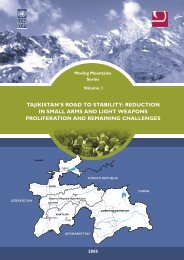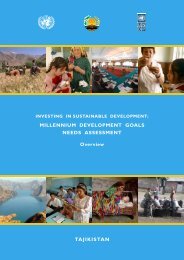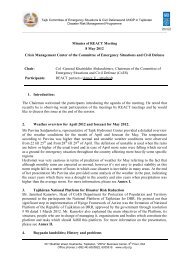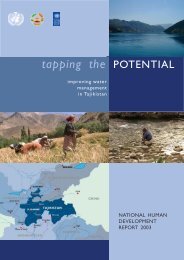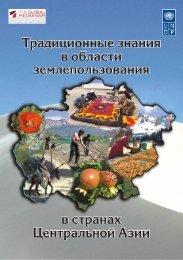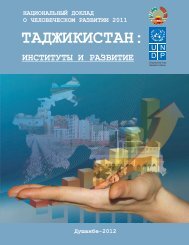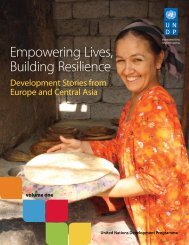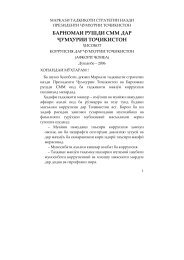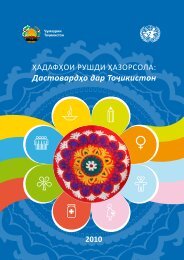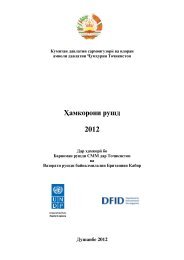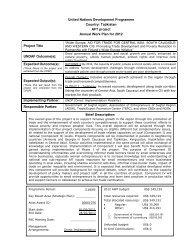Eng - UNDP in Tajikistan
Eng - UNDP in Tajikistan
Eng - UNDP in Tajikistan
You also want an ePaper? Increase the reach of your titles
YUMPU automatically turns print PDFs into web optimized ePapers that Google loves.
DEVELOPMENT PARTNER PROFILE<br />
NGO<br />
Welthungerhilfe<br />
Contact: Ms. Manuela Strobel<br />
Regional Director for Central Asia<br />
Tel: 224-72-36 Fax: 221-89-06<br />
E-mail: Manuela.Strobel@welthungerhilfe.de<br />
Website: www.welthungerhilfe.de<br />
Organization Profile<br />
Deutsche Welthungerhilfe e.V. is one of the largest German Non Governmental Organizations. It focusses its activities on the assistance to<br />
people <strong>in</strong> need <strong>in</strong> Asia, Africa and Lat<strong>in</strong> America through implementation of projects funded by private donations and public fund<strong>in</strong>g. The<br />
Federal German President Horst Kohler is its patron. The ma<strong>in</strong> donors of Welthungerhilfe are the Federal German Government, the European<br />
Union and the United Nations. S<strong>in</strong>ce its foundation <strong>in</strong> 1962, Welthungerhilfe has contributed approximately ˆ 1.8 billion <strong>in</strong> support of 3,496<br />
self-help projects, 973 projects for children and youth, and 892 emergency programmes <strong>in</strong> 70 countries.<br />
Committed, competent and reliable local partner organizations carry out the projects. The target groups are the poorest of the poor: landless<br />
people, small farmers, women, children and youth; people who have lost everyth<strong>in</strong>g as a result of war or environmental disasters; people who<br />
need start-up aid to lead a secure, dignified life. The projects concentrate on follow<strong>in</strong>g areas: agriculture and environment, survival and<br />
reconstruction aid, children and youth, dr<strong>in</strong>k<strong>in</strong>g water supply, crafts and bus<strong>in</strong>ess, strengthen<strong>in</strong>g self-help groups and partner organisations.<br />
Our staff work<strong>in</strong>g <strong>in</strong> Germany and abroad helps to ensure the professional, efficient support and execution of programmes, especially <strong>in</strong> the<br />
areas of emergency aid and rehabilitation. Welthungerhilfe has been receiv<strong>in</strong>g the seal of approval for donations from the German Central<br />
Institute for Social Issues (Deutsche Zentral<strong>in</strong>stitut fur soziale Fragen - DZI) every year s<strong>in</strong>ce it was founded for its economical and<br />
transparent use of funds.<br />
Welthungerhilfe is a member of the Alliance2015, a network of 6 European NGOs work<strong>in</strong>g <strong>in</strong> development.<br />
In 2006 the organization carried out 298 projects <strong>in</strong> 48 countries and thereby reached over 4 million people. The focal po<strong>in</strong>t of project work <strong>in</strong><br />
Africa, Asia and Lat<strong>in</strong> America is on rural areas.<br />
Past and Current Programmes<br />
Welthungerhilfe launched the first of its aid programmes <strong>in</strong> <strong>Tajikistan</strong> <strong>in</strong> June 1994. It was registered at the Foreign M<strong>in</strong>istry of the Republic<br />
of <strong>Tajikistan</strong> as an International NGO (Germanskaya Agroakzia, German Agro Action) with the registration number 017 on 18th October<br />
1994 and has been operat<strong>in</strong>g <strong>in</strong> the country s<strong>in</strong>ce then. Dur<strong>in</strong>g these thirteen years, a total of 67 projects have been run <strong>in</strong> <strong>Tajikistan</strong><br />
correspond<strong>in</strong>g to an overall value of 86 million ˆ. The priority regions where Welthungerhilfe is operat<strong>in</strong>g are Northern <strong>Tajikistan</strong> (Sughd,<br />
<strong>in</strong>clud<strong>in</strong>g Zerafshan valley) and Central <strong>Tajikistan</strong> (Rasht valley). In 2005 Welthungerhilfe started to operate also <strong>in</strong> Khatlon region.<br />
S<strong>in</strong>ce March 2001, Welthungerhilfe has been runn<strong>in</strong>g a Regional Co-ord<strong>in</strong>ation Office <strong>in</strong> Dushanbe, the chief tasks of which are<br />
adm<strong>in</strong>istrative and logistical support for the projects <strong>in</strong> <strong>Tajikistan</strong>, Uzbekistan and Kyrgyzstan, co-operation and communication with donor<br />
organizations and other relief organizations, backstopp<strong>in</strong>g of current as well as plann<strong>in</strong>g of new projects. Furthermore, Welthungerhilfe has<br />
project offices <strong>in</strong> Dushanbe, Khojant, Penjikent, Baljuvan, and Ayni. A field office has been set up <strong>in</strong> Garm to provide organizational and<br />
logistical support.<br />
Welthungerhilfe has always emphasiz<strong>in</strong>g the cooperation with local NGOs. In Northern <strong>Tajikistan</strong>, it has been work<strong>in</strong>g together with the<br />
Tajik NGO “Jovid” s<strong>in</strong>ce 2002 which operates <strong>in</strong> the area of agriculture extension services and award of seed credits and micro-credits to new<br />
privat farmers. In South <strong>Tajikistan</strong> Welthungerhilfe has been work<strong>in</strong>g together with the Local Micro Loan Fund “Haqiq” operat<strong>in</strong>g s<strong>in</strong>ce April<br />
2005 <strong>in</strong> the field of micro-credits. Both, “Jovid” and “Haqiq”, became important local partners for Welthungerhilfe as well as for other<br />
<strong>in</strong>ternational organizations work<strong>in</strong>g <strong>in</strong> the country. Another close cooperation exists with the Tajik NGO ASDP NAU, with whom<br />
Welthungerhilfe is jo<strong>in</strong>tly implement<strong>in</strong>g an Eco Tourism Project <strong>in</strong> Zerafshan Valley. In 2007 the local NGO “Azal” has started its activities<br />
<strong>in</strong> the Districts of Nurobad, Rasht, Tavildara and Tajikobad.<br />
In 2007 eleven projects have been under implementation <strong>in</strong> <strong>Tajikistan</strong>, of which five started the same year. All eleven projects have a total<br />
volume of 5.9 mln Euro which is funded by the EC (ECHO, IBPP, FSP, TACIS), World Bank, the German M<strong>in</strong>istry of Economic<br />
Cooperation, the German Foreign Department, and Welthungerhilfe itself. The projects focus on food security, poverty reduction, community<br />
based ressource management, watershed management and environment, and disaster preparedness.<br />
Welthungerhilfe supports national non-governmental organisations (NGOs) and cooperates closely with them on a partnership basis. To a<br />
grow<strong>in</strong>g degree, these NGOs are turn<strong>in</strong>g <strong>in</strong>to important factors <strong>in</strong> Tajik civil society and <strong>in</strong>to execut<strong>in</strong>g agencies for complex development<br />
ventures. In 2007, four of the eleven projects have been implemented by partner organisations of Welthungerhilfe.<br />
Under the difficult civil war conditions, Welthungerhilfe's <strong>in</strong>itial activities from 1994 on were restricted to immediate measures to cope with<br />
the emergency situation. The population was supported through free distribution of food, w<strong>in</strong>ter cloth<strong>in</strong>g and fuel for heat<strong>in</strong>g. The programme<br />
was supplemented by rehabilitation measures for destroyed <strong>in</strong>frastructure. Thanks to these activities, which were cont<strong>in</strong>ued <strong>in</strong> times of civil<br />
war both <strong>in</strong> government-controlled areas and <strong>in</strong> the opposition’s territories, Welthungerhilfe enjoys a considerable amount of trust among the<br />
local population.<br />
In 1996, a broad-based agricultural programme with a volume of more than eight million Euros was launched support<strong>in</strong>g smallholders and<br />
farmers’ associations <strong>in</strong> the north and the central region of <strong>Tajikistan</strong> up to 2002. The programme was diversified up to the level of self-help<br />
and the promotion of local food production. Activities <strong>in</strong>itially concentrated on provid<strong>in</strong>g seed and credits <strong>in</strong> k<strong>in</strong>d, fertiliser and tra<strong>in</strong><strong>in</strong>g on<br />
how to grow potatoes and wheat as well as assistance with the organisational development of new farmers’ associations. S<strong>in</strong>ce 2002, the<br />
activities have been cont<strong>in</strong>ued by the Tajik NGO "Jovid" <strong>in</strong> Sughd prov<strong>in</strong>ce and <strong>in</strong> an own-implemented project <strong>in</strong> the country’s central<br />
region. The credits <strong>in</strong> k<strong>in</strong>d have been turned <strong>in</strong>to cash micro-credits for all agricultural activities. Right from the start, the chief target group of<br />
Source: Aid Coord<strong>in</strong>ation and Project Monitor<strong>in</strong>g System Database<br />
© State Committee on Investments and State Property Management of the RT<br />
121




